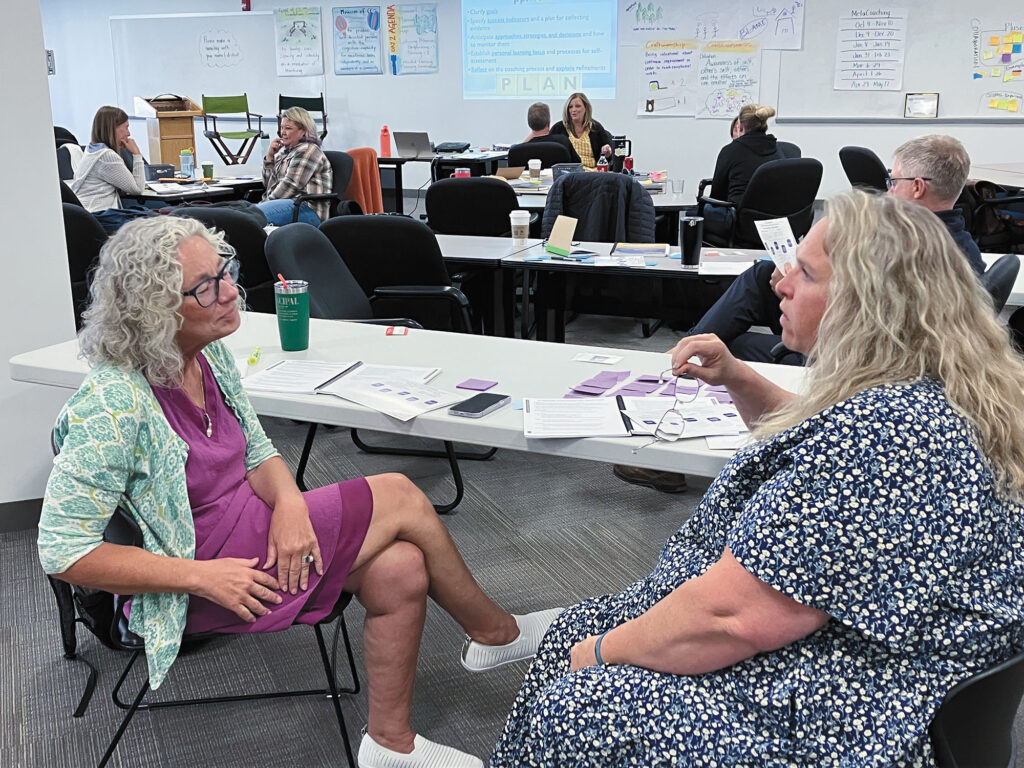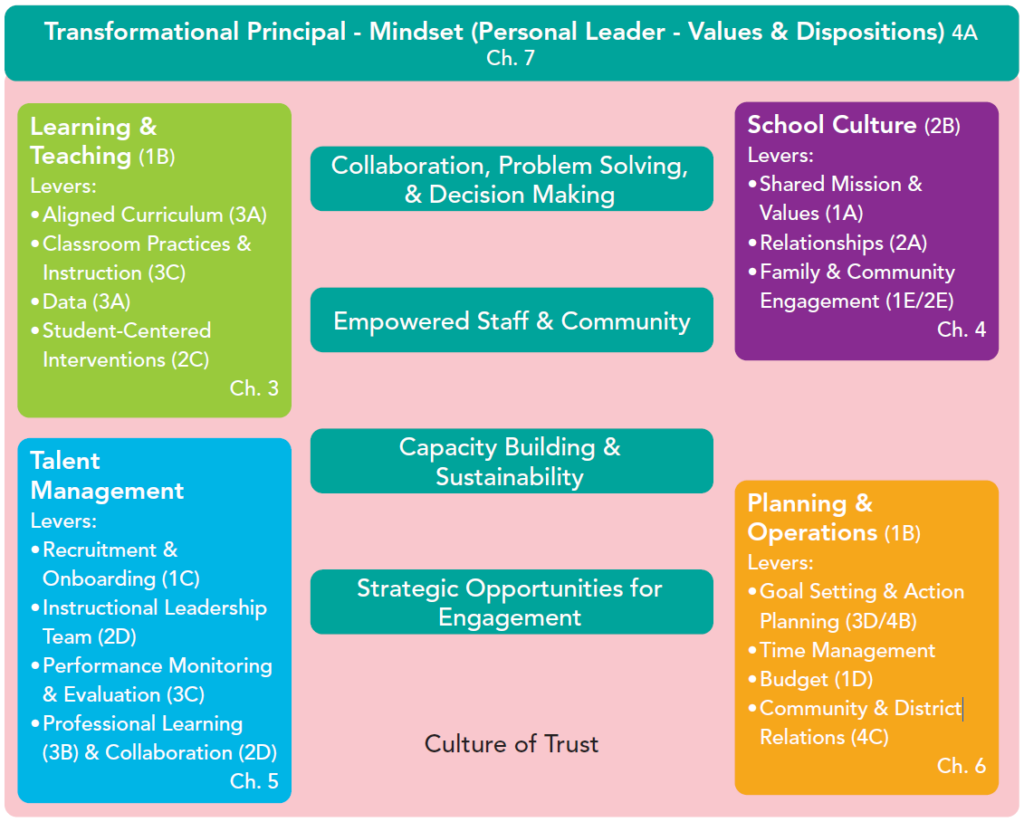Colorado’s Principal Leadership Institute

It is no secret that the principalship feels nearly impossible at times and seems ever more challenging each year. Much of what principals face daily is not anything they were trained for in their principal preparation programs, and the induction or mentoring for many was minimal at best. Yet, it is their responsibility to create a positive climate and culture, stay on top of learning and teaching, recruit and retain staff, and manage the minutiae of each day. The principalship can be lonely, and school leaders need better support systems to succeed in the job. In Colorado, we have developed a program that provides support, networking, and professional learning to both principals being coached and their peers who are coaching them.
In 2019, the legislature passed an act to create a school leadership pilot program to provide professional development for public elementary, middle, and high school principals. The Colorado Department of Education was directed to design and implement the program that would identify high-quality principals (coaches) who would work with other principals selected to receive professional development through the program. The act specified that the program must also include professional development in distributive and collaborative leadership skills to improve educator retention, school climate and culture, collective efficacy, and student outcomes.
In 2022, the legislature extended the program and removed the word “pilot” from the name. The program, known as the Principal Leadership Institute (PLI), is now in its fourth year. So far, results have been promising, with principals reporting an increased sense of self-efficacy, and school districts with at least one PLI principal reporting a decrease in principal turnover.

PHOTO COURTESY OF TRISH MALIK
The theory of action behind the program is simple. If principals can build systems that create a sense of collective teacher efficacy and a culture and climate that empowers, then teacher retention and satisfaction will increase, and this will have a positive impact on student learning outcomes. Educators thrive with the right type of professional development to hone their skill and improve their craft. Throughout their careers, teachers and instructional coaches are provided with an array of professional development opportunities to meet the demands of student needs to increase student learning. Principals, too, need relevant and rigorous professional development to sharpen their skills. The PLI focuses on coaching and distributive leadership that not only support leaders to build teacher capacity in schools but also results in teachers feeling like a valued partner in school leadership so all building stakeholders are working together to create an environment where each and every student is learning at high levels.
How It Works
The PLI is a two-year program focusing on developing the leadership capacity of principals and coaches. To date, we have developed 80 coaches and served 87 principals in 53 school districts. While there are three pathways a principal can choose for a coaching focus, distributive leadership; early literacy (science of reading) implementation; or first-year principalship, all are rooted in distributive leadership. Principal participants work alongside exemplary principal coaches using a Cognitive Coaching framework. The PLI program consists of leadership for professional learning, site visits, and monthly coaching sessions with principal coaches. This model offers high levels of support for leaders (via principal coaches) throughout the program to sustain and integrate the skills and behaviors learned during self-paced modules.
The coaching work in the PLI is grounded in the book, Breakthrough Principals: A Step-By-Step Guide to Building Stronger Schools by Jean Desravines, Jaime Aquino, and Benjamin Fenton. The figure below shows that distributive leadership supports the interdependent categories of work that principals do. According to New Leaders, effective schools focus on the following categories: learning and teaching; school culture; talent management; and planning and operations as seen in the figure’s green, pink, blue, and orange rectangles. An additional category, personal leadership (values and dispositions), is also shown. These categories, of course, do not stand alone, but function interdependently in real life.

Within each category, different levers describe a school leader’s broad efforts—the bullet points in each rectangle. We might consider the content of the categories and levers as what principals do in a school. Distributive leadership could be described as the how and the elements a leader leverages to “share” the responsibility of the work. Everything in the figure is based on a culture of trust (noted at the bottom of the figure), an essential element of distributive leadership. Without trust, not much gets accomplished.
The other elements of distributive leadership (collaboration, problem-solving, and decision-making; empowered staff and community; capacity building and sustainability; and strategic opportunities for engagement) are represented in the yellow rectangles and are employed within each of the four categories and levers. The leader’s mindset and personal leadership values and dispositions sit atop everything else because they encompass all that a successful principal does to set the tone for student and adult relationships and practices in the school. The other four elements of distributive leadership in yellow are employed within each of the four categories and its levers.
PLI coaches help principals deeply reflect on where their strengths lie in both the four categories and within distributive leadership. From that reflection, together they create a two-year coaching plan to strengthen the principal’s leadership. Principals and coaches access modules in Moodle, an online learning platform that provides bite-sized professional learning around distributive leadership. One lesson we learned is that when coaching is not connected to a strategic growth plan, it becomes reactionary and focused on the crisis du jour instead of propelling the school’s or the principal’s growth forward.
While the PLI is grounded in a strong conceptual model and rich content for principals, the layered support focused on the coaches makes this model unique. Many times, coaching programs identify people who demonstrate excellence in their jobs and assume they automatically would make a good coach without any training. In the PLI, we have focused on building the capacity of the coaches. Every coach is carefully vetted through an interview process to ensure they exhibit the competencies of a high-quality principal that align with the Colorado Principal Quality Standards. Prior to being assigned to coach another principal, each cohort of coaches completes an eight-day Cognitive Coaching Foundations Training during their first year in the program. In addition, they receive monthly coaching on their coaching (what we call meta-coaching) while they put their coaching skills to work with their own staff members in their schools. The principal coaches-in-training bring a video to each meta-coaching session to analyze while they are coached to improve their coaching skills. Even after their first year in the program, coaches continue to have their own professional growth plan and personalized options for continued meta-coaching and refresher coaching modules to hone their coaching craft. This truly is a win-win model in which coaches take their leadership to the next level while giving back and supporting other principals with their leadership. Ultimately, teachers and students in the schools of both the principals and the coaches benefit as well.
A Network of Support
The principalship is too important for leaders to go it alone. Yet many principals across the country lack a network of support. Whether school leaders work in rural, urban, or suburban schools, all fill multiple roles on top of the principal job, and it is no wonder school leaders sometimes struggle to keep up with the demands. With opportunities to connect virtually and in person multiple times each year, the PLI enables principals to refine their leadership skills through interactions with a cohort of their peers, engage in problems of practice in a safe environment, and receive and provide feedback. The PLI works because its focus on the person-to-person connection in coaching energizes school leaders who need it most. A recent conversation with a veteran principal coach-in-training with more than 10 years of experience in the principalship, underscores this point. Last spring, she was dusting off her resume because the job had become increasingly difficult to manage. But after her experience in the PLI, she reports feeling rejuvenated and excited to learn new skills that will help her refine her own leadership skills. The program has breathed new life into her principalship. It could do so for school leaders in other districts, too.
Trish Malik is a leadership development specialist with the Colorado Department of Education with 34 years of experience in education. Previously, she was the principal of Laurene Edmondson Elementary School in Loveland, CO.
